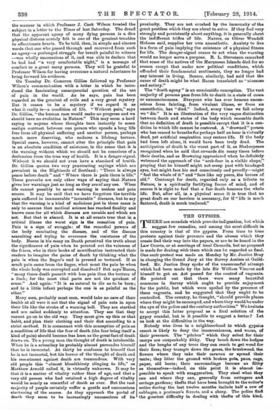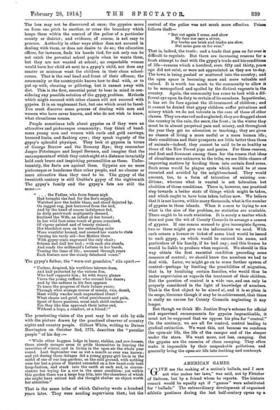THE GYPSIES.
THERE are scandals which provoke indignation, but which suggest few remedies, and among the most difficult in this country is that of the gypsies. From time to time protests against their presence and the abuses which they create find their way into the papers, or are to be heard in the Law Courts, or at meetings of local Councils, but no proposal is made for dealing with them which can be regarded as final. One such protest was made on Monday by Mr, Justice Bray in charging the Grand Jury at the Surrey Assizes at Guild- ford. Mr. Justice Bray spoke of the unsuccessful attempt which had been made by the late Sir William Vincent and himself to get an Act passed for the control of vagrants. He pointed out that there were many beautiful commons in Surrey which ought to provide enjoyment for the public, but which were spoiled by the presence of these vagrants, and he suggested that they ought to be controlled. The country, be thought, "should provide places where they might be encamped, and where they would be under the eye of the police and the sanitary authorities." We hesitate to accept this latter proposal as a final solution of the gypsy scandal, but is it possible to suggest a better? Let us look at the difficulties in the way.
Nobody who lives in a neighbourhood to which gypsies resort is likely to deny the inconveniences, and worse, of their presence. The " pitches " which they aeleot for their camps are unspeakably filthy. They break down tho hedges and the boughs of any trees they can reach to get wood for their fires; they trample down the grass, the brushwood, the flowers where they take their caravan or spread their tents ; they litter the ground with broken pots, pans, rags, paper, old boots; their surroundings become as filthy as themselves—indeed, on thin point it is almost im- possible to speak with exaggeration. They steal what they can and where they can, generally from oottagers and cottage gardens ; thefts that have been brought to the writer's notice during the last twelve months include half a row of cabbages, a postman's ferrets, and a sheep. The police find the greatest difficulty in dealing with thefts of this kind,
The loss may not be discovered at once; the gypsies move on from one pitch to another, or cross the boundary which keeps them within the control of the police of a particular county or district; and evidence, of course, is not easy to procure. Authority in other ways either does not succeed in dealing with them, or does not desire to do so ; the education officer, for instance, finds his hands tied, for not only can he not catch the potential school pupils when he wants them, but they are not wanted at school; no respectable woman would have her child sit next to a gypsy's child, nor does any master or mistress want the children in their clean school- rooms. That is the real head and front of their offence; the community or the countryside known how to deal with, or to put up with, cheating or pilfering, but it cannot away with dirt. This is the first, essential point to bear in mind in con- sidering any possible solution of the gypsy, problem. Methods which might succeed with other classes will not succeed with gypsies. It is an unpleasant fact, but one which must be faced. You must discover some process of dealing with men and women who have never known, and who do not wish to know, what cleanliness means.
People sometimes talk about gypsies as if they were an attractive and picturesque community; they think of hand- some young men and women with curls and gold earrings, bronzed limbs, and flashing eyes ; they speak vaguely of the gypsy's splendid physique. They look at gypsies in terms of George Borrow and the Romany Rye ; they remember Jasper Petulengro and Isopel Bernere, and imagine that the encampments of which they catch sight at a distance invariably hold such brave and inspiriting personalities as those. Unfor- tunately, the facts are against them. Gypsies are no more picturesque or handsome than other people, and no cleaner or more attractive than they used to be. The gypsy of the twentieth century is still Crabbe's gypsy of the eighteenth The gypsy's family and the gypsy's fate are still the same:- ` . . the Father, who from fences nigh
Had brought the fuel for the fire's supply, Watched now the feeble blase, and stood dejected by.
On ragged rug, just borrowed from the bed, And by the hand of coarse indulgence fed, In dirty patchwork negligently dressed, Reclined the Wife, an infant at her breast; In her wild face some touch of grace remained,
Of vigour palsied and of beauty stained ;
Her bloodshot eyes on her unheeding mate Were wrathful turned, and seemed her wants to state Cursing his tardy aid—her Mother there With gypsy-state engrossed the only chair ; Solemn and dull her look; with such she stands, And reads the milkmaid's fortune in her bands, Tracing the lines of life ; assumed through years Each feature now the steady falsehood wears."
The gypsy's father, the "worn-out grandsire," sits apart " Useless, despised, his worthless labours done, And half protected by the vicious Son,
Who half supports him ; he with heavy glance Views the young ruffians who around him dance; And by the sadness in his face appears
To trace the progress of their future years ; Through what strange course of misery, vice, deceit, Must wildly wander each unpractised cheat ! What shame and grief, what punishment and pain, Sport of fierce passions, must each child sustain— Ere they like him approach their latter end, Without a hope, a comfort, or a friend !"
The penetrating vision of the poet may he set side by side with the picture drawn by the practised observer of country sights and country people. Gilbert White, writing to Daines Barrington on October 2nd, 1775, describes the "peculiar people " of his day
:- "While other beggars lodge in barns, stables, and cow-houses, these sturdy savages seem to pride themselves in braving the severities of winter, and in living in the open air the whole yeas round. Last September was as wet a month as ever was known; and yet during those deluges did a young gypsy-girl lie-in in the midst of one of our hop-gardens, on the cold ground, with nothing over her but a piece of blanket extended on a few bawl-rode bent hoop-fashion, and stuck into the earth at each end, in circum- stances too trying for a cow in the same condition yet within this garden there was a large hop kiln, into the chambers of which she might have retired had she thought shelter an object worth her attention."
That is the same tribe of which Calverley wrote a hundred years later. They were needing supervision then; but the control of the police was not much more effective. Prism follows theft-
" Bat out again I come, and show
My face nor mire a ativor,
For trades are brisk and trades are slow, But mine goes on for ever."
That is, indeed, the truth: and a trade that goes on for ever is difficult to regulate. But there are increasing reasons for a fresh attempt to deal with the gypsy's trade and his conditions of life—reasons which a hundred, even fifty and thirty, years ago did not exist, or were not appreciated as they are to-day. The town is being pushed or scattered into the country; and the open space is becoming more and more valuable and valued. It is worth too much to the community to allow it to be monopolized and spoiled by the dirtiest vagrants in the country. Again, the community has come to look with a dif- ferent eye upon its duty to certain of its members. Inparticulae, it has set its face against the ill-treatment of children ; and it cannot be denied that gypsy children suffer privations and misery which we do not tolerate in the case of those of other classes. They are starved and neglected; they are dragged about the country in the rain, the snow, the frost ; in the winter they must he in almost perpetual pain and misery, and throughout the year they get no education or teaching; they are given no chance of living a more useful or a more human life ; their conditions and their prospects are little better than those of animals—indeed, they cannot be said to be so healthy as those of the New Forest pigs and ponies. For these reasons, and first and foremost among them for the reason that ideas of cleanliness are unknown to the tribe, we see little chance of improving matters by herding them into certain fixed areas. Such areas would be plague spots which would be at once resented and avoided by the neighbourhood. They would amount, too, to a form of toleration of existing con- ditions; whereas what is wanted is not toleration but abolition of those conditions. There is, however, one practical step towards a better state of things which might be taken, and which ought to have been taken before now. We believe that it is not known, within many thousands, what is the number of gypsies in these islands. When it comes to trying to see what is the size of the problem, no statistics are available. There ought to be such statistics. It ie surely a matter which does not pass the wit of County Councils to arrange a census of gypsies. If one census seemed to give incomplete figures, two or three might give us the information we need. With each census a licence or ticket of some kind would be issued to each gypsy, on which would be entered his name, and particulars of his family, if he bad any; and this licence he would be liable to produce when required. We should in this way obtain the first essential condition preceding some measure of control; we should know the numbers we had to deal with. Later, we might go on to some farther system of control—perhaps by limiting the possibilities of migration, that is, by localizing certain families, who would thus be under supervision as regards the treatment of their children. But the question of control is a wide one, and can only be properly considered in the light of knowledge of numbers. That is the first object to be aimed at, and it is so plain in its scope, tiresome though it may be in achievement, that there ie really no excuse for County Councils neglecting it any longer.
But though we think Mr. Justice Bray's scheme for official and supervised encampments for gypsies impracticable, it must not be supposed that we oppose his plea for "control." On the contrary, we are all for control, control leading to gradual extinction. We want this, not because we condemn the open-air life, the life of the camper and of the sleeper under the stars. We want more, not less, camping. But the gypsies are the enemies of clean camping. They often make it impossible by their unspeakable pollutions, and generally bring the open-air life into loathing and contempt.















































 Previous page
Previous page